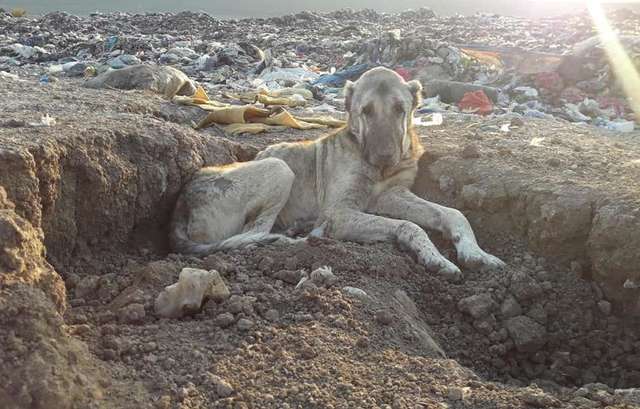Woman Sees Photo Of Dog Living In Dump — And Knows She Has To Help Him
“Some dogs seem to look directly into your soul ... that’s the only way I can explain it.”
Crystal Carson felt her heartstrings tug the moment she saw a photo of Kratos, a Kangal Shepherd dog living at a landfill in Corum, Turkey.
“I thought, ‘Oh my God. You’ve got to be kidding me. He looks so old,’” Carson, cofounder of Rescuers Without Borders (RWB), told The Dodo. “You could literally see every rib on him and his spine.”
Kratos also had a severe case of mange, which had caused him to lose most of his fur.
“I’m thinking, ‘This dog is not going to make it,’” Carson said.
It may not have looked good for Kratos, but Carson couldn’t stop thinking about him. In fact, Kratos’ photo haunted her.
“Some dogs seem to look directly into your soul from their pictures — that’s the only way I can explain it,” Carson said.
Kratos wasn’t the only dog at this landfill in Corum — several hundred other dogs currently live here, surviving on scraps of discarded food and bedding down in garbage to keep warm. In 2017, Carson and a few friends established RWB to help get these dogs regular food and medical care, and to even find some of them homes.
But sadly, it’s not possible to rescue and rehome every dog at the landfill due to a lack of resources — and it’s never easy for the RWB team to choose which ones to help.
“It’s hard to pick and choose, but we often choose puppies because they don’t have the ability to survive in the landfill,” Carson told The Dodo in February. “Last year, we lost almost every single litter, either being frozen to death or through starvation. We take older dogs as well, and the ones who wouldn’t make it if someone didn’t do something.”
Kratos, who’s about 8 years old, was certainly a candidate for rescue — and when cold weather hit Corum in November, it became urgent to get him out. Gokce Erdogan, one of the local rescuers in Turkey, was worried he was going to die out there.
“Gokce messaged me and said, ‘Please take him. I’ll figure something out,’” Carson said.
Carson and the RWB team hurried to arrange for Kratos to be taken to the vet. Then they went to catch him — but this part wasn’t hard.
“He could barely move because he was so dehydrated and emaciated,” Carson said. “He was just starving. And he was super friendly.”
Kratos was treated for mange, dehydration and an eye infection, but overall, he was surprisingly healthy.
“We were completely blown away and shocked because his blood work was almost perfect, and you wouldn’t have thought that with the condition he was in,” Carson said.
After his vet visit, Kratos still needed somewhere to live — but finding a suitable place with space was tricky. In the end, the team managed to get him into an independent rescue facility in Bursa, Turkey, which is run by a man named Emre Demir.
“The facility is outside, but they have doghouses, they get food every day, they get fresh water and they get medical attention,” Carson said. “So I reached out to him [Demir] and asked him if Kratos could come to his place. He was more than happy to help out.”
Carson would eventually like to move Kratos to the United States and find him a proper home, but getting him the appropriate travel documents has been another challenge.
“[Kangal dogs] … are not allowed to be exported,” Carson said. “They’re deemed a national treasure in Turkey, which is the irony of all of this. They’re supposed to be the best of the best over there, even though there are tons dying every day in the streets and in the landfills.”
Carson is sure that Kratos wouldn’t have survived if he’d stayed at the landfill.
“He would have been dead, especially with this last snow and freeze,” Carson said. “We lost so many puppies and so many of the older ones.”
More importantly, Kratos is happy and healthy now — and he seems grateful to be alive.
“He’s been doing absolutely terrific,” Carson said. “His fur is starting to grow back. He still looks like he’s in very rough shape, but for us, we’ve seen it before. We’ve seen how they can come from the brink of death … we know it’s a long process.”










Comments